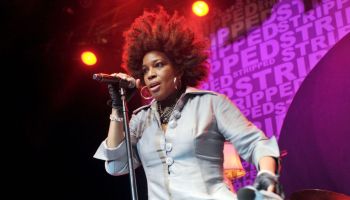In case you haven’t yet heard, you will soon catch wind of Emeli Sandé. The 26-years-young British singer/songwriter has been playing the piano since she was 10 and singing even before then. To date, she’s penned jams for Tine Tempah, Wiley, Susan Boyle and others. Last year, Emeli lent her lyrical composition skills to her very own voice and released what would become chart-topping hits.
She sparked quite a bit of pandemonium in the UK—so much that her first album “Our Version of Events” was the UK’s biggest selling debut of 2012. Word traveled across the seas and her name is now acquiring more and more fame on US turfs. Her single “Next to Me” and its remix featuring Kendrick Lamar have received the American stamp of approval as they’re both regularly streaming from airwaves.
Must Read: Sir Elton John Deems Emeli Sande The Next Big Thing
Her talent is undeniable, gaining her the highly sought-after BRITs Critics’ Choice Award. She’s even got the look down pat—from her sensational sense of style to her edgy pompadour hair! It only makes sense that she becomes a huge, international icon. Unfortunately, what makes sense and what happens don’t always line up—especially in the world of entertainment. Emeli is a refreshing talent with genius capabilities and a voice that carries both on the radio and the stage, but she’s also Black. Perhaps if her father wasn’t African, or at least a Black African, her shots at an Adele-like status would be a lot higher.
Though they have different styles, both Adele and Emeli have a wondrous way with words (and cool accents), coupled with the ability to sing those words in the most soulful of ways. Adele, however, is White and because we typically don’t expect White women with red hair and green eyes to belt out soul, her capabilities have been held in the highest regard.
Adele’s debut album went double platinum in the US. Her sophomore album, 21, broke the record for longest number-1 album by a woman in history—a feat unconquered since Whitney Houston’s “The Bodyguard”—and it is the fourth best-selling album of the past 10 years in the United States. Since the spawn of her career, which was only five years ago, the “Chasing Pavements” singer has already managed to snag nine Grammy Awards (12 nominations), four American Music Awards (5 nominations) and most recently, she was nominated for and won an Oscar for Best Original Song. Similarly, the late Amy Winehouse won 6 Grammy awards of her 8 nominations and would have probably gained even more commercial success if not for her unfortunate, very public battle with drug addiction, which led to her untimely death.
While both Adele and Winehouse are true talents whose songs with substance are a breath of fresh air, neither of them were anything new upon their debut, minus the White factor. Before an Adele or an Amy, there was Jill Scott, India.Arie, Vivan Green and Chrisette Michele (who stepped on the scene after Amy but before Adele), along with others who are just as skilled in both the writing and vocal arenas—and much better live if you ask me, but that’s beside the point.
Despite their comparable level of talent, however, they don’t have as much to show for it when it comes to major awards and accolades. Since the release of her first studio album in 2001, Jill Scott has only taken home three Grammy Awards, out of her 13 nominations; and she has not been nominated for any AMAs. Fellow soul singer India.Arie has only won four of her whopping 21 Grammy nominations. Vivian Green has never been nominated for a mainstream award—not even for “Emotional Rollercoaster!” Chrisette Michelle won one of two Grammy nominations. I also find it interesting that when Black soul singers, like these ladies, are nominated for more mainstream awards such as the Grammys or the AMAs, they’re mainly restricted to R&B or Urban Performance categories versus more general categories like Best Song or Album of the Year.
This happens way too often in popular culture, so I can’t help but wonder if this will also be the case with Emeli. Hopefully not because it would truly be a shame for another talent powerhouse to not evolve into the limitless icon she has the ability of becoming. Her album is a beautiful body of work with influences from the greats, including one of her idols Lauryn Hill. Maybe the world (mainly America since the UK and her Scottish home has already shown her a significant amount of love) will look beyond her hue and be so gracious as to grant her the superstardom she deserves. Fingers crossed!
Do you agree or disagree that White artists with soul are held in higher regards than Black artists with soul?
Let’s keep in touch! Follow me on Twitter: @VerityReign
LIKE HelloBeautiful On Facebook!
More On Emeli Sande:
The Next Big Voice: Emeli Sande
Emeli Sande Strips Down Coldplay’s “Every Teardrop Is A Waterfall” [VIDEO]
Check Out This Amazing Gallery Of Powerful Songs By Women!
If It’s White, It’s Right: Emeli Sande’s Success Doesn’t Match Her Soulful Counterparts was originally published on hellobeautiful.com















